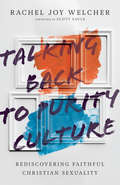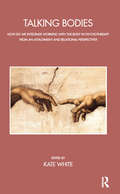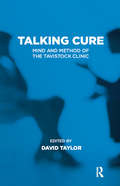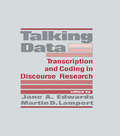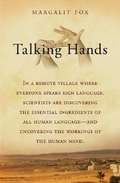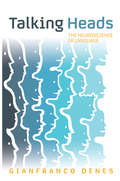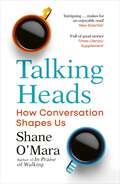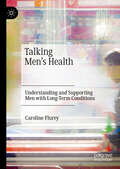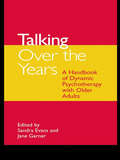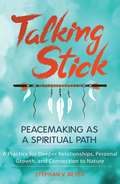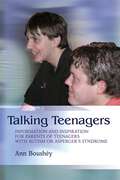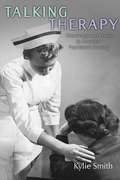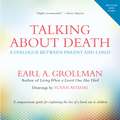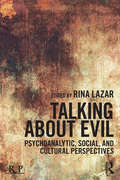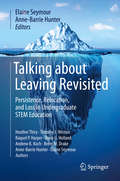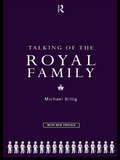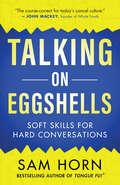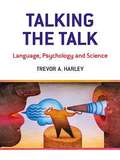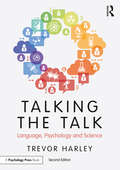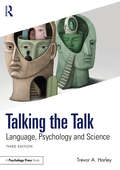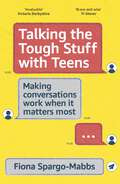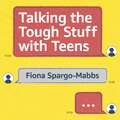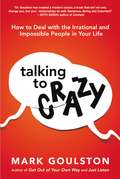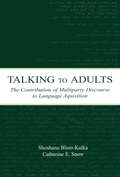- Table View
- List View
Talking Back to Purity Culture: Rediscovering Faithful Christian Sexuality
by Rachel Joy WelcherIt's time to talk back. The generation born into evangelical purity culture has grown up, and many have started families of their own. But as time goes on, it's becoming more evident that many still struggle with purity culture's complicated legacy—its idolization of virginity, its mixed messages about modesty and lust, and its promise of a healthy marriage and great sex for those who follow the rules. In Talking Back to Purity Culture, Rachel Joy Welcher reviews the movement carefully, examining its teachings through the lens of Scripture. Compassionate, faithful, and wise, she charts a path forward for Christians in the ongoing debates about sexuality—one that rejects legalism and license alike, steering us back instead to the good news of Jesus. It's time to talk back to purity culture—and this book is ready to jump-start the conversation.
Talking Bodies: How do we Integrate Working with the Body in Psychotherapy from an Attachment and Relational Perspective? (The Bowlby Centre Monograph Series)
by Kate WhiteThis monograph brings together the presentations from the nineteenth John Bowlby Memorial Conference in 2012, organised by The Bowlby Centre. It explored the growing role of the body in relational psychotherapy over the last decade, and to bring us up to date in thinking about the relationship between attachment, the body and trauma. Questions addressed included: How do we anchor the new understandings we are gaining within the framework of attachment? How might the integration of these ideas about the body change what we do in the consulting room? What impact might this have on the therapy relationship? Can we maintain and respect the place of a secure, attuned attachment between therapist and client, and its healing potential, at the centre of our therapeutic work?
Talking Cure: Mind and Method of the Tavistock Clinic (Tavistock Clinic Series)
by David TaylorThis book is written to accompany a BBC 2 TV series about the Tavistock Clinic, an NHS mental health institute which treats patients and trains professionals. The programmes of the series are about therapy — talking — as a way of dealing with difficulties that life can entail.
Talking Data: Transcription and Coding in Discourse Research
by Jane A. Edwards Martin D. LampertThis book presents the reader with a set of diverse, carefully developed and clearly specified systems of transcription and coding, arising from contrasting theoretical perspectives, and presented as alternative choices, situated within the theoretical domain most natural to each. The perspectives represented include first and second language acquisition, interethnic and crosscultural interaction, information structure, and the study of discourse influences on linguistic expression. In the contributed chapters, the designers of these systems provide a distillation of collective experiences from the past quarter century, telling in their own words their perspectives on language processes, how these perspectives have shaped their choice of methodology in transcription and coding of natural language, and describing their systems in detail. Overview chapters by the editors then provide design principles and guidelines concerning issues pertinent to all systems, including such things as reliability, validity, ease of learning, computational tractability, and robustness against error. The final chapter is a compendium of existing computerized archives of language data and information sources together with details concerning data access and use.
Talking Hands: What Sign Language Reveals About the Mind
by Margalit Fox<P>Imagine a village where everyone "speaks" sign language. Just such a village - an isolated Bedouin community in Israel with an unusually high rate of deafness - is at the heart of Talking Hands: What Sign Language Reveals About the Mind. There, an indigenous sign language has sprung up, used by deaf and hearing villagers alike. It is a language no outsider has been able to decode, until now. <P>A New York Times reporter trained as a linguist, Margalit Fox is the only Western journalist to have set foot in this remarkable village. In Talking Hands, she follows an international team of scientists that is unraveling this mysterious language. <P>Because the sign language of the village has arisen completely on its own, outside the influence of any other language, it is a living demonstration of the "language instinct," man's inborn capacity to create language. If the researchers can decode this language, they will have helped isolate ingredients essential to all human language, signed and spoken. But as Talking Hands grippingly shows, their work in the village is also a race against time, because the unique language of the village may already be endangered. <P>Talking Hands offers a fascinating introduction to the signed languages of the world- languages as beautiful, vital and emphatically human as any other- explaining why they are now furnishing cognitive scientists with long-sought keys to understanding how language works...
Talking Heads: The Neuroscience of Language
by Gianfranco DenesThe origin, development, and nature of language has been the focus of theoretical debate among philosophers for many centuries. Following the pioneering clinical observations 150 years ago of loss of language following a cerebral lesion, language started to be considered a biological system, that could be investigated scientifically. As a consequence, an increasing number of scientists began to search for its anatomical and functional basis and its links with other such cognitive systems. The relatively recent introduction of neuroimaging tools, such as PET and fMRI, has brought rapid and groundbreaking developments to the field of Neurolinguistics. In this book, Denes harnesses these advances to adopt a biolinguistic approach to the study of a subject that increasingly sees the collaboration of linguists, experimental psychologists, neuroscientists and clinicians. Talking Heads reviews the latest research to provide a concise analysis of the multifaceted aspects of language which focuses both on theoretical aspects and physical implementation. Following an up-to-date description of acquired language disorders, and their contribution to the design of a functional architecture of language, the book illustrates the neurological process involved in the production and comprehension of spoken and written language, as well as investigating the neurological and functional systems responsible for sign language production and first and second language acquisition. With a glossary of the anatomical and linguistic terms, this book provides an invaluable resource to undergraduate and graduate students of psychology, psycholinguistics and linguistics.
Talking Heads: The New Science of How Conversation Shapes Our Worlds
by Shane O'MaraFrom neurons to nations, Talking Heads is a stunning survey of the science of human connection and communication.'Delightfully well-written' IRISH TIMES'Intriguing ... Makes for an enjoyable read' NEW SCIENTIST'Full of good stories' TIMES LITERARY SUPPLEMENTTalking to each other is a primal behaviour. It’s a key part of what makes us human. Yet the science of human connection has largely remained a mystery. Only recently have scientific advances allowed us to peer into the purpose of conversations and uncover their extraordinary impact.In this groundbreaking book, the first of its kind written by a leading neuroscientist, Professor Shane O’Mara expertly reveals how talking affects all our lives. What does it mean that we mostly think, and speak, in five-minute bubbles around the present moment? Is the fact that we instinctively trust what others say empowering or a hindrance? And how do our very nations begin as conversations?Moving from the personal to the social and ultimately towards an urgent and radical new perspective on the defining phenomenon of our times, populist nationalism, Talking Heads is the story of how conversation shapes us and constructs our worlds – and how, together, we can talk our way into a better tomorrow.
Talking Men's Health: Understanding and Supporting Men with Long-Term Conditions
by Caroline FlureyThis book explores male health psychology in relation to chronic health conditions. Using data from men with rheumatic diseases as a starting point, this book draws on the wider literature to focus on how men talk about different aspects of living with long-term health issues. This includes how men discuss the impact of chronic illness on their sense of control and self-reliance, masculine identity, body image, mental health, sex and intimacy, and for those living with a life-limiting condition how they discuss facing their mortality. It also covers how men self-manage and what influences their help-seeking behaviours. Whilst men are often branded as ‘hard to reach’, the author argues that when given permission and provided with the right environment, men will talk about their health. This book takes the stance men are under-served by health services and includes suggestions for developing support services for health and mental health that meet men’s needs and preferences. Focussing on the experiences and support needs of men with long-term conditions, this is an ideal reading for clinicians, healthcare professionals, and practitioners working with men with long-term conditions, as well as early career researchers and students interested in male psychology, men’s health, and gender and society.
Talking Over the Years: A Handbook of Dynamic Psychotherapy with Older Adults
by Sandra Evans Jane GarnerHow can we work effectively with older people? What contribution can be made by the field of psychodynamics? It is now recognised that older adults can benefit from psychodynamic therapy and that psychodynamic concepts can help to illuminate the thorny issues of aging and the complications of later life. Talking Over the Years begins by examining how ideas of old age are represented by the key psychodynamic theorists of the twentieth century including Freud, Jung, Klein and Winnicott. Contributors go on to draw on their own experiences in a range of settings to demonstrate the value of psychodynamic concepts in clinical practice, covering subjects such as: brief and long-term work with individuals, couples and groups the expressive therapies: art, music, dance and movement ethical considerations training, supervision and support sexuality. Illustrated by a wealth of clinical material, Talking Over the Years increases psychodynamic awareness, helping practitioners become more sensitive to their patients' needs to the benefit of both the patient and the professional.
Talking Stick: Peacemaking as a Spiritual Path
by Stephan V. BeyerPractices for openhearted speaking and devout listening to restore harmony in families, relationships, schools, workplaces, and communities • Details how to approach life with a listening heart and create a sacred space for communication • Offers exercises for new peacemaking circles, ceremonial ways to begin each circle, and peacemaker tools to unmask the needs and feelings behind conflict • Explains how to apply this practice in multiple ways, with groups large and small People are afraid of conflict: it is something “bad” that must be managed and resolved. In the face of conflict we focus only on facts--who’s at fault and who should be punished--rather than seeking to restore harmony. But conflict is inevitable and presents an opportunity to establish deeper connections with others. By learning to speak honestly and listen devoutly, we can overcome our culture’s hierarchical and punitive approach to conflict. We can learn to relate to each other in a sacred manner and create relationships and communities that are egalitarian, liberating, and transformational. Revealing that we are all peacemakers at heart, Steve Beyer details how to approach life with a listening heart and create a safe and sacred space for communication: the peacemaking circle, centered on the talking stick. Whoever holds the talking stick gets to speak. There are no interruptions, no questions, no challenges, no comments. People speak one at a time, honestly from their hearts, and they listen devoutly with their hearts to each person who speaks. And, as Beyer shows, the effect can be miraculous. The author explains how to apply this practice with groups large and small to deepen relationships, heal old wounds, and restore harmony among families, spouses, classmates, coworkers, and communities. Sharing stories from his work as a peacemaker, he offers exercises for new talking stick circles, ceremonial ways to begin each circle, and tools to ensure the telling of complete stories in cases of conflict. He addresses the nature of apology, forgiveness, and the urge for revenge, and he explores the spiritual challenges faced by those who walk the peace path. Exploring the shamanic roots of the talking stick practice, the author extends the lessons of the healing circle and the listening heart from our homes, schools, and communities into our relationship to spirit and the Earth.
Talking Teenagers: Information and Inspiration for Parents of Teenagers with Autism or Asperger's Syndrome
by Ann BoushéyAnn Boushéy's teenage son Jon was diagnosed with high-functioning autism in kindergarten. Having mastered the day-to-day challenges that parenting a young child with autism or Asperger's Syndrome pose, Talking Teenagers considers questions surrounding parenting across the spectrum during the teenage years. Written out of her own experience, this inspirational book provides the information that will encourage other parents with teens on the autism spectrum. Covering everyday topics, from what to take on vacation and dealing with anger, to sex education and planning for the parents' own demise, Ann ends each chapter with thoughtful vignettes: 'Chicken Nuggets for the Soul'. After reading this book, parents will come away with a sense of empowerment and feeling that they are not alone, while professionals will gain a valuable and compassionate insight into the world of parenting a teenager on the autism spectrum.
Talking Therapy: Knowledge and Power in American Psychiatric Nursing (Critical Issues in Health and Medicine)
by Kylie SmithTalking Therapy traces the rise of modern psychiatric nursing in the United States from the 1930s to the 1970s. Through an analysis of the relationship between nurses and other mental health professions, with an emphasis on nursing scholarship, this book demonstrates the inherently social construction of ‘mental health’, and highlights the role of nurses in challenging, and complying with, modern approaches to psychiatry. After WWII, heightened cultural and political emphasis on mental health for social stability enabled the development of psychiatric nursing as a distinct knowledge project through which nurses aimed to transform institutional approaches to patient care, and to contribute to health and social science beyond the bedside. Nurses now take for granted the ideas that underpin their relationships with patients, but this book demonstrates that these were ideas not easily won, and that nurses in the past fought hard to make mental health nursing what it is today.
Talking about Death: A Dialogue between Parent and Child
by Earl A. GrollmanWhy do people die? How do you explain the loss of a loved one to a child? This book is a compassionate guide for adults and children to read together, featuring a read-along story and answers to questions children ask about death.Talking about Death is a classic guide for parents helping their children through the death of a loved one. With a helpful list of dos and don'ts, an illustrated read-along dialogue, and a guide to explaining death, Grollman provides sensitive and timely advice for families coping with loss. This redesigned and updated edition explains what children at different developmental stages can and can't understand about death; reveals why it's crucial to be honest about death; helps you understand the way children express emotions like denial, grief, crying, anger, and guilt; and discusses children's reactions to different kinds of death, from the death of a parent to the death of a pet.
Talking about Evil: Psychoanalytic, Social, and Cultural Perspectives (Relational Perspectives Book Series)
by Rina LazarHow can we talk about evil? How can we make sense of its presence all around us? How can we come to terms with the sad fact that our involvement in doing or enabling evil is an interminable aspect of our lives in the world? This book is an attempt to engage these questions in a new way. Written from within the complicated reality of Israel, the contributors to this book forge a collective effort to think about evil from multiple perspectives. A necessary effort, since psychoanalysis has been slow to account for the existence of evil, while philosophy and the social sciences have tended to neglect its psychological aspects. The essays collected here join to form a wide canvas on which a portrait of evil gradually emerges, from the Bible, through the enlightenment to the Holocaust; from Kant, through Freud, Klein, Bromberg and Stein to Arendt, Agamben and Bauman; using literature, history, cinema, social theory and psychoanalysis. Talking about Evil opens up a much needed space for thinking, in itself an antidote to evil. It will be of interest to psychoanalysts, psychotherapists, and scholars and students of philosophy, social theory and the humanities.
Talking about Leaving Revisited: Persistence, Relocation, and Loss in Undergraduate STEM Education
by Heather Thiry Timothy J. Weston Raquel P. Harper Dana G. Holland Andrew K. Koch Brent M. DrakeTalking about Leaving Revisited discusses findings from a five-year study that explores the extent, nature, and contributory causes of field-switching both from and among “STEM” majors, and what enables persistence to graduation. The book reflects on what has and has not changed since publication of Talking about Leaving: Why Undergraduates Leave the Sciences (Elaine Seymour & Nancy M. Hewitt, Westview Press, 1997). With the editors’ guidance, the authors of each chapter collaborate to address key questions, drawing on findings from each related study source: national and institutional data, interviews with faculty and students, structured observations and student assessments of teaching methods in STEM gateway courses. Pitched to a wide audience, engaging in style, and richly illustrated in the interviewees’ own words, this book affords the most comprehensive explanatory account to date of persistence, relocation and loss in undergraduate sciences.Comprehensively addresses the causes of loss from undergraduate STEM majors—an issue of ongoing national concern.Presents critical research relevant for nationwide STEM education reform efforts.Explores the reasons why talented undergraduates abandon STEM majors.Dispels popular causal myths about why students choose to leave STEM majors.This volume is based upon work supported by the Alfred P. Sloan Foundation Award No. 2012-6-05 and the National Science Foundation Award No. DUE 1224637.
Talking of the Royal Family
by Michael Billig Prof Michael BilligTo talk about royalty is to talk of many things: privilege, equality, nationality, morality, family life, parenting, divorce, the media and more. Important themes and issues flow through the seemingly trivial everyday chatter about royalty.Now with a new preface, Talking of the Royal Family was the first serious full-length study of royalty to emerge from this rhetorical perspective and remains relevant today.
Talking on Eggshells: Soft Skills for Hard Conversations
by Sam HornSilver winner of the 2023 Foreword INDIES award for business & economics by Foreword Reviews Want to know how to speak up instead of shut down, face challenges head-on instead of run the other way, and keep your cool even when others don’t? Talking on Eggshells shows you how. This inspiring book shares everyday character-building situations and offers examples of what to say and not to say so you’ll never be tongue-tied or tongue-twisted again. Sam Horn’s relatable, real-life stories and energizing, instantly usable insights will help you think on your feet, reduce stress, and deal more proactively and diplomatically with bosses, coworkers, customers, friends, family members, partners, children, even that date who just ghosted you. You’ll love this go-to guide for clearly communicating what you want and need to get the results you desire and deserve.
Talking the Talk: Language, Psychology and Science
by Trevor A. HarleyLanguage makes us human, but how do we use it and how do children learn it? Talking the Talk is an introduction to the psychology of language. Written for the reader with no background in the area or knowledge of psychology, it explains how we actually "do" language: how we speak, listen, and read. This book provides an accessible and comprehensive introduction to psycholinguistics, the study of the psychological processes involved in language. It shows how it's possible to study language experimentally, and how psychologists use these experiments to build models of language processing. The book focuses on controversy in modern psycholinguistics, and covers the all the main topics, including how children acquire language, how language is related to the brain, and what can go wrong - and what can be done when something does go wrong. Structured around questions that people often ask about language, the emphasis of Talking the Talk is how scientific knowledge can be applied to practical problems. It also stresses how language is related to other aspects of psychology, particularly in whether animals can learn language, and the relation between language and thought. Lively and amusing, the book will be essential reading for all undergraduate students and those new to the topic, as well as the interested lay reader.
Talking the Talk: Language, Psychology and Science
by Trevor A. HarleyLanguage makes us human, but how do we use it and how do children learn it? Talking the Talk is an introduction to the psychology of language. Written for the reader with no background in the area or knowledge of psychology, it explains how we actually "do" language: how we speak, listen, and read. This book provides an accessible and comprehensive introduction to psycholinguistics, the study of the psychological processes involved in language. It shows how it's possible to study language experimentally, and how psychologists use these experiments to build models of language processing. The book focuses on controversy in modern psycholinguistics, and covers the all the main topics, including how children acquire language, how language is related to the brain, and what can go wrong - and what can be done when something does go wrong. Structured around questions that people often ask about language, the emphasis of Talking the Talk is how scientific knowledge can be applied to practical problems. It also stresses how language is related to other aspects of psychology, particularly in whether animals can learn language, and the relation between language and thought. Lively and amusing, the book will be essential reading for all undergraduate students and those new to the topic, as well as the interested lay reader.
Talking the Talk: Language, Psychology and Science
by Trevor A. HarleyTalking the Talk provides a comprehensive introduction to the psychology of language, written for the reader with no background in the field or any prior knowledge of psychology.Written in an accessible and friendly style, the book answers the questions people actually have about language; how do we speak, listen, read, and learn language? The book advocates an experimental approach, explaining how psychologists can use experiments to build models of language processing. Considering the full breadth of psycholinguistics, the book covers core topics including how children acquire language, how language is related to the brain, and what can go wrong with it. Fully updated throughout, this edition also includes a new chapter on bilingualism and new coverage of AI and the rise of ChatGPT.Talking the Talk is written in an engaging style that does not hesitate to explain complex concepts. It is essential reading for all undergraduate students and those new to the topic, as well as the interested lay reader.
Talking the Tough Stuff with Teens: Making Conversations Work When It Matters Most
by Fiona Spargo-Mabbs"They've always wanted me to be open and honest with them, I've spent years explaining stuff to them, and sometimes they still don't understand everything" - Milly, 16"Your parents aren't actually hatching a plan to ruin your life..." Jim, 52From minor matters (tidiness, homework, sleep) to big and important ones (relationships, mental ill health, drugs and alcohol), teenagers and their parents often struggle to talk to each other - and talking is key if your young person is facing new challenges as they leave childhood behind. A well-timed conversation, a listening ear, a non-judgemental and receptive attitude - all these can make an enormous and lasting impact on how safely and happily a teenager navigates this crucial stage of their development.Oh, if only it were that easy.It's not always easy to talk to your teenager, or for them to talk to you, but it is critical and may even be life-saving. This book draws extensively on hundreds of conversations that Fiona Spargo-Mabbs has conducted with young people and parents in focus groups and school and college workshops, to give a framework for tackling tough conversations about difficult things, without judgement or anger. It gives context and insight, based on the latest neuroscience findings on the teenage brain and, importantly, it gives hundreds of prompts and plenty of practical suggestions and strategies to make communication between parents and young people a two-way street that builds the foundations for a strong relationship with your adult child. Covering everything from the small stuff, like curfews and screen time, to the tough stuff of sex, self-harm and suicide, this is a warm, compassionate and important book that draws on lived experience and the lives of young people as they are, not as we think they might, or should, be.
Talking the Tough Stuff with Teens: Making Conversations Work When It Matters Most
by Fiona Spargo-Mabbs"They've always wanted me to be open and honest with them, I've spent years explaining stuff to them, and sometimes they still don't understand everything" - Milly, 16"Your parents aren't actually hatching a plan to ruin your life..." Jim, 52From minor matters (tidiness, homework, sleep) to big and important ones (relationships, mental ill health, drugs and alcohol), teenagers and their parents often struggle to talk to each other - and talking is key if your young person is facing new challenges as they leave childhood behind. A well-timed conversation, a listening ear, a non-judgemental and receptive attitude - all these can make an enormous and lasting impact on how safely and happily a teenager navigates this crucial stage of their development.Oh, if only it were that easy.It's not always easy to talk to your teenager, or for them to talk to you, but it is critical and may even be life-saving. This book draws extensively on hundreds of conversations that Fiona Spargo-Mabbs has conducted with young people and parents in focus groups and school and college workshops, to give a framework for tackling tough conversations about difficult things, without judgement or anger. It gives context and insight, based on the latest neuroscience findings on the teenage brain and, importantly, it gives hundreds of prompts and plenty of practical suggestions and strategies to make communication between parents and young people a two-way street that builds the foundations for a strong relationship with your adult child. Covering everything from the small stuff, like curfews and screen time, to the tough stuff of sex, self-harm and suicide, this is a warm, compassionate and important book that draws on lived experience and the lives of young people as they are, not as we think they might, or should, be.
Talking the Tough Stuff with Teens: Making Conversations Work When It Matters Most
by Fiona Spargo-MabbsTalking to your teenager shouldn't be hard, but sometimes it's the most difficult thing in the world. Healthy, open, non-judgemental conversations with young people can be - literally - life-saving."They've always wanted me to be open and honest with them, I've spent years explaining stuff to them, and sometimes they still don't understand everything" - Milly, 16"Your parents aren't actually hatching a plan to ruin your life..." Jim, 52From minor matters (tidiness, homework, sleep) to big and important ones (relationships, mental ill health, drugs and alcohol), teenagers and their parents often struggle to talk to each other - and talking is key if your young person is facing new challenges as they leave childhood behind. A well-timed conversation, a listening ear, a non-judgemental and receptive attitude - all these can make an enormous and lasting impact on how safely and happily a teenager navigates this crucial stage of their development.Oh, if only it were that easy.It's not always easy to talk to your teenager, or for them to talk to you, but it is critical and may even be life-saving. This audiobook draws extensively on hundreds of conversations that Fiona Spargo-Mabbs has conducted with young people and parents in focus groups and school and college workshops, to give a framework for tackling tough conversations about difficult things, without judgement or anger. It gives context and insight, based on the latest neuroscience findings on the teenage brain and, importantly, it gives hundreds of prompts and plenty of practical suggestions and strategies to make communication between parents and young people a two-way street that builds the foundations for a strong relationship with your adult child. Covering everything from the small stuff, like curfews and screen time, to the tough stuff of sex, self-harm and suicide, this is a warm, compassionate and important audiobook that draws on lived experience and the lives of young people as they are, not as we think they might, or should, be.(P) 2023 Hodder & Stoughton Limited
Talking to 'Crazy': How to Deal with the Irrational and Impossible People in Your Life
by Marshall Goldsmith Mark Goulston“[Goulston’s]ideas are a bit counter-intuitive but they really do shift the dynamic and help people diffuse and disarm the irrational person leading to more positive outcomes.” -- Online MBA Because some people are beyond difficult… Let’s face it, we all know people who are irrational. No matter how hard you try to reason with them, it never works. So what’s the solution? How do you talk to someone who’s out of control? What can you do with a boss who bullies, a spouse who yells, or a friend who frequently bursts into tears? In his book, Just Listen, Mark Goulston shared his bestselling formula for getting through to the resistant people in your life. Now, in his breakthrough new book Talking to Crazy, he brings his communication magic to the most difficult group of all—the downright irrational. As a psychiatrist, Goulston has seen his share of crazy and he knows from experience that you can’t simply argue it away. The key to handling irrational people is to learn to lean into the crazy—to empathize with it. That radically changes the dynamic and transforms you from a threat into an ally. Talking to Crazy explains this counterintuitive Sanity Cycle and reveals: Why people act the way they do • How instinctive responses can exacerbate the situation—and what to do instead • When to confront a problem and when to walk away • How to use a range of proven techniques including Time Travel, the Fish-bowl, and the Belly Roll • And much more You can’t reason with unreasonable people—but you can reach them. This powerful and practical book shows you how.
Talking to Adults: The Contribution of Multiparty Discourse to Language Acquisition
by Catherine E. Snow Shoshana Blum-KulkaThis volume provides a comprehensive and in-depth analysis of the contribution of multiparty intergenerational talk in a variety of cultures to the development of children's communicative capacities. The book focuses on the complexity of the cultural and interactional contexts in which pragmatic learning occurs and re-examines certain assumptions implicit in research on language socialization to date, such as primacy of dyadic interactions in the early ages and the presupposition of a monolingual social matrix. One of the aims of the book is to demonstrate the degree of cultural diversity in paths of pragmatic development. Individual chapters present empirically grounded analyses of talk with children of all ages, in different participation structures and in a variety of cultures. In pursuing this theme the volume is meant to further enrich cross-cultural perspectives on language socialization by providing in each of its chapters an empirically grounded analysis of the development of one specific dimension of discursive skill. The nine invited chapters comprise new empirical work on the development of specific discourse dimensions. Authors have been asked also to adopt a reflexive stand on their line of research and to incorporate in the chapter a comprehensive and critical perspective on former work on the discursive dimension investigated. The discourse dimensions represented in the volume include narratives, explanations, the language of control in intergenerational and intragenerational talk, the language of humor and affect, and bilingual conversations. The volume offers a rich spectrum of cultural variety in pragmatic development, including studies of American, Greek, Japanese, Mayan, Norwegian, and Swedish children and families.
